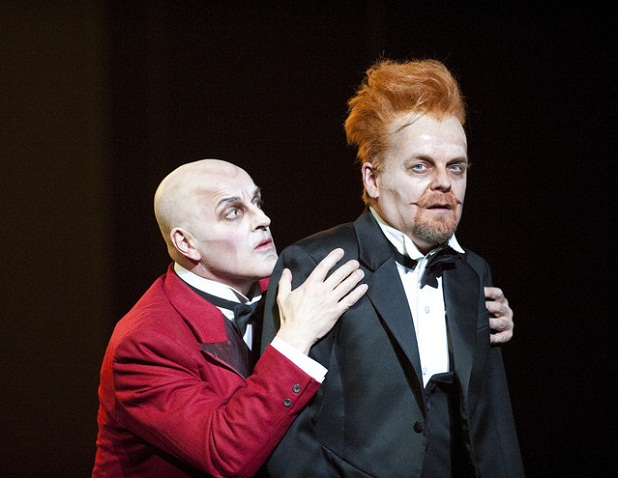Opera The Damnation of Faust (ENO)
Classical & Opera, New in Ceasefire - Posted on Friday, May 27, 2011 0:00 - 1 Comment
Christopher Purves and Peter Hoare – Photograph by Tristom Kenton
By Paul Guest
The Damnation Of Faust, English National Opera
Conducted by Edward Gardner
Directed by Terry Gilliam
Christine Rice, Peter Hoare and Christopher Purves.
The Damnation of Faust: “Notoriously difficult to stage”, Terry Gilliam said, “Berlioz definitely didn’t play by the rules, have I? Probably not” – The English National Opera continue with their string of radical invitations to high profile film directors to try and reinvent and innovate opera at the Coliseum in London, this time to Monty Python member Terry Gilliam, and the production was as radical as the invitation.
Gilliam constantly chuckles in excitement, it is like he is a small child let loose in a sweet shop. “I wanted actors… they just, err do the singing” Gilliam talks about his wonderful cast of operatic actors: Christopher Purves, Peter Hoares and Christine Rice. The narrative cleverly placed in the age of Nazi Germany. Gilliam’s exhuberant nature is portrayed throughout the production through acting, narrative, movement, set and design, everything has Gilliam’s name all over it.
Berlioz is definitely Gilliam’s master throughout this production; “The music is everything… You can’t fight it… It overwhelms me, you can’t take the piss…Berlioz gets you, right there!” – To us musos, Berlioz is nothing new, but Gilliam’s perspective is young- “I enter this as a kid”.
The English National Opera have let him run wild with anything he wanted, whatever the risk maybe. Mike Figgis was allowed the exact freedom and his production was slain by audience and critics alike, so the risk was enormous. I was incredibly anxious about seeing the production because of the previous failures but ended up relieved by this more than successful outcome. “The stage is a whole other world… I could do this on film… I was terrified”.
He very wisely turned the opportunity down to begin with however The Damnation of Faust was enviably going to be Gilliam’s greatest feat. If anyone could make this work I’m pretty assured that Gilliam could: And low and behold he did. An amazing directorial debut from Terry Gilliam and a risk that has most certainly paid off.
The music is strange: In fact I find it difficult to even place this “work” into the category of Opera. It is neither an oratorio nor is it a cantata. The original narrative is very small and the singing is split up by plenty of musical interludes that definitely do not follow the usual concepts of 19th Century opera. First performed in 1846 in Paris, Berlioz himself did not call it an opera but instead a “légende dramatique” (dramatic legend) merely a work for orchestra, voice and chorus. Nonetheless the work is rarely staged due to the difficulty of narrative and its placement inside in the opera house.
The lavish sets designed by German Hildegard Bechtler, whose previous works for the ENO include the critically acclaimed Peter Grimes, are truly magnificent and incredibly poignant in places. The use of technology throughout the production is also astounding and creates an incredibly moving finale- which I won’t spoil. The singing too was marvellous; Christine Rice sings a moving heartbroken, damned Marguerite with passion and tear-jerking beauty while the evil-voiced Christopher Purves makes his role debut as Mephistopheles, who is essentially Satan.
Peter Hoare’s hair was a highlight for me- perhaps I might even adopt it- He presents the love crazy Faust who gives up his soul for the girl he so greatly loves. Hoare portrays a most wonderful Faust though his upper register was weak and often misplaced. Maestro Edward Gardner lifts his baton and triggers the flight of Berlioz’s glorious music from the pit into the auditorium with tremendous beauty and power. The Chorus of the English National Opera, whose part is so key in Berlioz’s beautiful music- especially in the finale chorus piece, also incredibly sang The Damnation of Faust to its full extent projecting his beautiful harmony and clarity.
“I am Faust, it’s me… he is me” Gilliam exclaimed in his natural craziness. Terry Gilliam, now, not a child of Opera but a master of operatic vision.
This has been a co-production with De Vlaamse Opera, Antwerp. The Damnation of Faust runs at the London Coliseum on various dates until the 7th June 2011. Call the Box office on 0871 911 0200 or visit eno.org.
Paul Guest is Ceasefire‘s Opera critic. He also writes for Classical Music Magazine, Gramophone and is the resident interviewer at Opera Britannia.
1 Comment
Operation Guest – Does Opera in concert work? – Ceasefire Magazine



[…] fact, sometimes they become a necessity: If we look at Berlioz’s La damnation de Faust (Which has recently been staged by Terry Gilliam at the English National Opera) the narrative in the piece isn’t very strong and […]